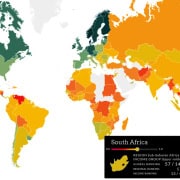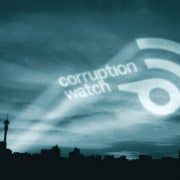|
Getting your Trinity Audio player ready...
|
 More cases of fraud and bribery, involving police and government officials, are reported to the National Anti-Corruption Hotline than other corrupt activities.
More cases of fraud and bribery, involving police and government officials, are reported to the National Anti-Corruption Hotline than other corrupt activities.
Fraud and bribery have been the most common allegations lodged through the National Anti-Corruption Hotline (NACH) since it was established, according to a Public Service Commission (PSC) document titled “Measuring the effectiveness of the National Anti-Corruption Hotline: third biennial report (2011)”.
Since its launch, the hotline has received 7 922 reports of corruption, 1 522 of which, or 19 percent, fall under the fraud and bribery category. It defines fraud and bribery as those cases relating to traffic officials receiving bribes from motorists and government officials accepting kickbacks from members of the public in order to obtain government tenders.
Launched in September 2004, the National Anti-Corruption Hotline allows people to report fraudulent activities in the public sector through a centralised toll-free hotline. It is an initiative of the PSC, which itself is a government entity responsible for monitoring and evaluating the organisation and administration of the public service. All cases of corruption relating to the public service are reported through Deloitte, the professional services firm, which is the hotline’s service provider.
Deloitte employs key personnel to ensure the smooth running of the call centre. The call operators, through the use of a template designed by the PSC, analyse the data reported to them to determine whether there is sufficient information to successfully investigate the allegation. Once all the information has been obtained from the caller, the report is loaded on the PSC’s Case Management System. The reports are then redirected to the relevant departments for further investigation.
The National Anti-Corruption Hotline is outsourced to Deloitte to ensure its credibility and to promote the anonymous reporting of incidents of corruption. “The integrity of the hotline is based on the credibility of the organisation handling it and the processes and principles that guide investigation and reporting on cases referred by the hotline,” reads the PSC report.
“It is very important that the NACH achieves a reputation of professionalism that will provide assurance to employees and the public that all information will be handled confidentially and that anonymity will be maintained.”
Anonymous caller
Of the callers who report cases of alleged corruption through the hotline, 85 percent want to remain anonymous, while 15 percent are whistle-blowers who provide their contact details. Mimi le Roux, the chief executive Deloitte’s Tip-offs Anonymous unit, of which the hotline is part, says the unit was established in early 1999 in response to a growing requirement from major private and public sector organisations for a professionally managed, outsourced and independent reporting service.
Le Roux said trends differed from industry to industry, and so a direct comparison between private and public sectors could not be made, and it was not possible to say which sector generated the most complaints. All government departments fell under the PSC and were not comparable with other clients. Other public sector clients such as municipalities and state-owned companies were either grouped separately or within a sector, depending on the nature of operations.
In the private sector, the financial services sector led the promotion of ethics hotlines, and the volume of reports was substantial; it was followed by the retail and mining sectors, added Le Roux. “The key success factor for any organisation’s whistle-blowing line is an effective awareness campaign … Deloitte Tip-Offs Anonymous assists our clients with this, should they choose to make use of this service. The volume of calls is directly influenced by the scope of the awareness campaigns.”
An effective awareness campaign meant that all stakeholders, employees and suppliers should be able to respond positively when asked whether the organisation had a hotline, she explained, and they should at a minimum know where to find the details of how to report, if they did not have them at hand. The awareness campaign should have reached individuals through the use of various communication media. Campaigns could include presentations, pamphlets and posters, hand-outs, multi-lingual DVDs and electronic campaigns.
Deloitte could also help its public sector clients create awareness campaigns of the reporting mechanisms. Once a complaint has been lodged, Deloitte hands it over to its clients, including the National Anti-Corruption Hotline. In some instances, clients ask the Deloitte Risk Advisory unit to help with the forensic investigation.
Abuse of state resources
According to the National Anti-Corruption Hotline report, most complaints lodged through the hotline fall under the fraud and bribery category. The second biggest category is the alleged abuse of government resources, which ran to 995 complaints. These include incidents of officials being accused of driving government-owned vehicles recklessly and at high speed.
About 15 percent of the cases in this category are in relation to theft of petrol from government-owned vehicles and abuse of petrol cards, while 35 percent of the reports allege that government-owned vehicles are used as taxis for personal benefit. The majority of the cases regarding the abuse of government resources are reported in Mpumalanga Province.
The third category involves 889 cases of mismanagement of government funds by public officials, the report reads. These include mismanagement of school funds by teachers and school principals; senior managers in government departments giving unlawful instructions to junior officials to authorise particular expenditure; and irregular expenditure and non-compliance with operational policies of departments.
Home Affairs
Corruption at the Department of Home Affairs takes fourth place with 781 cases. The report highlights that department officials have fraudulently sold South African identity documents, passports, birth and marriage certificates to foreigners. In these instances, the documents are sold for R600 to R2 500. However, corruption in Home Affairs has dropped over the years, the report notes.
There were 181 cases reported in the financial year 2008/2009 compared to 179 cases in the 2009/2010 financial year. In addition, 392 officials who were involved in acts of corruption have been dismissed since 2004.
Since 2004, the hotline has also received 720 complaints involving procurement irregularities, such as the collusion between a person involved in the awarding of a tender and an associate who is often a family member or a friend seeking to win the tender.
The success of the National Anti-Corruption Hotline depends on the extent to which the departments investigate the cases referred to them and the action taken against those who are found guilty of corruption. Out of 7 922 cases lodged through the hotline and referred to the relevant departments since 2004, the PSC has only received feedback on 2 948 cases. The slow rate of feedback could be attributed to a lack of investigative capacity by departments or it could be due to a lack of accountability by senior managers to deal effectively with cases from the hotline referred to departments, according to the report.
Between 1 September 2004 and 31 August 2010, only 1 821 cases were closed after investigations were finalised by the respective departments. During this period, 1 273 officials were charged with misconduct for corrupt activities, of which only 190 resulted in prosecutions. The rest were dismissed, suspended, fined, demoted or given final written warnings.
Successful investigations of corruption reported to the hotline since 2004 has resulted in the recovery of R120-million from the perpetrators by various departments.







